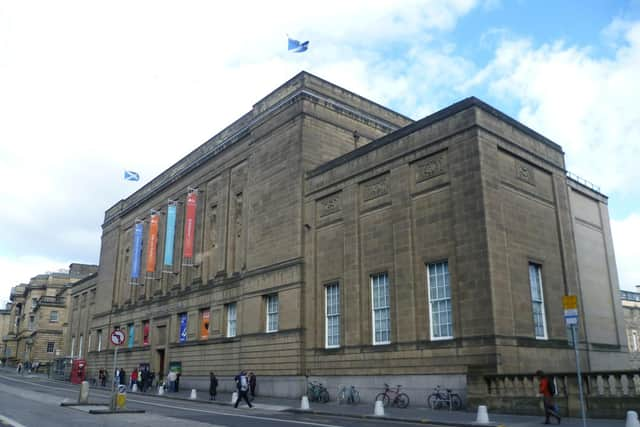Leading historian speaks out as National Library of Scotland rewrites 'harmful' colonial language
Terms now regarded as outdated will be replaced in catalogues and indexes with a recommended glossary of preferred words set to influence presentation of exhibitions, websites and learning resources.
Carissa Chew, who led the work at NLS and whose work will inform the library’s policy on decolonising its collections, said discriminatory descriptions of material contributed to a “culture of oppression” and needed to be reviewed to ensure they were accurate and respectful.
Advertisement
Hide AdAdvertisement
Hide AdDescriptions of manuscripts relating to the Transatlantic Slave Trade and Africa American history have already been reviewed with the preferred words also being introduced to readers searching for material.


Aberdeen and Glasgow universities are undertaking similar work, which comes amid a broader drive within the cultural and heritage sector in Scotland to address how the legacies of colonialism are presented in collections and archives.
However, leading historian Professor Emeritus Sir Tom Devine of the University of Edinburgh, described the work at NLS as a “classic example of the error of anachronism by imposing the values, and in this case the terminology and language of the present, on the past of two centuries or more ago”.
The recommended glossary of inclusive terminology at NLS has been compiled using multiple resources and academic papers.


It suggests catalogue references to ‘slave’ should be changed to ‘enslaved person’ to better reflect how this identity was enforced using violence.
A recommended term for ‘plantation’ – which has been criticised for being euphemistic – is ‘forced labour plantation’ or ‘slave labour plantation’.
A ‘runaway’ enslaved person should be described as a ‘fugitive of slavery’ with caution surrounding the use of the term Transatlantic Slave Trade given the view that no consensual transaction of trade took place. Trafficking has been suggested as an alternative, but this has not been widely adopted.
Ms Chew, a graduate of Edinburgh and Cambridge universities and now a History PhD student and teaching assistant at the Univeristy of Hawai’i at Manoa, said the Black Lives Matter movement, which came to the fore following the murder of George Floyd by police officer Derek Chauvin in Minneapolis last year, pushed institutions to “examine their own roles in the upholding of white privilege”.


Advertisement
Hide AdAdvertisement
Hide Ad"The cultural heritage sector (with its predominantly white workforce) was no exception,” she added.
Ms Chew said: “There is a need to review catalogues, websites, and learning resources that use discriminatory terms to describe groups with protected characteristics because this contributes to a culture of oppression in which these people are made to feel like second-class citizens.
"If you choose to replicate the racist, sexist, homophobic, and ableist language of the colonial past, it sends a clear message to marginalised groups today that you don’t respect their self-identities and their equal status as human beings.”
She added advisory notices were important given some materials were used in the past to justify the “oppression, segregation, torture, and sometimes genocide of groups with protected characteristics”.


She added: "It is important to safeguard the emotional and mental welfare of users and warn them when they might encounter materials, including visual and sound materials, that might be distressing.”
Professor Devine said he understood NLS might wish to avoid causing offence.
He said terms such as ‘enslaved people’ was an accurate description, which he used frequently in his own work.
“Much more problematic, however, is another example, ‘forced labour plantation’. This gives the impression that slaves were like prisoners undergoing a finite period of hard labour. In fact there is no comparison whatsoever between the two,” he added.
Advertisement
Hide AdAdvertisement
Hide Ad"Slaves were subject to the most degrading form of exploitation until death entirely at the whim of their masters. Their children were born into slavery for life and could be sold off away from their families like commodities rather than humans if plantation owners and their agents willed it.
"Ironically, by removing ‘harmful language’ and substituting euphemisms, the brutal and awful historical realities of slavery have been actually expunged.


"This kind of initiative brings no credit to the institutions concerned. It can only confuse students and compound the crass error of anachronism that their teachers try to remove from their approach to understanding about the past.”
A spokeswoman for National Library of Scotland said there was still “much work” to be done to review the recommendations, which will inform the development of a formal policy on decolonising its collections.
She added: “Fundamentally, we are aiming to provide accurate and meaningful descriptions of our collections while at the same time situating our collections in the appropriate historical context. We are developing inclusive descriptions and appropriate content advice, this is very much a work in progress.”
A message from the Editor:Thank you for reading this article. We're more reliant on your support than ever as the shift in consumer habits brought about by Coronavirus impacts our advertisers.
If you haven't already, please consider supporting our trusted, fact-checked journalism by taking out a digital subscription.
Comments
Want to join the conversation? Please or to comment on this article.
